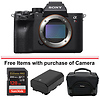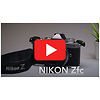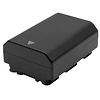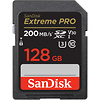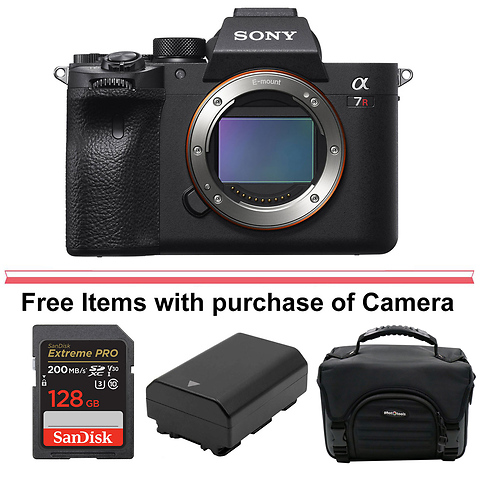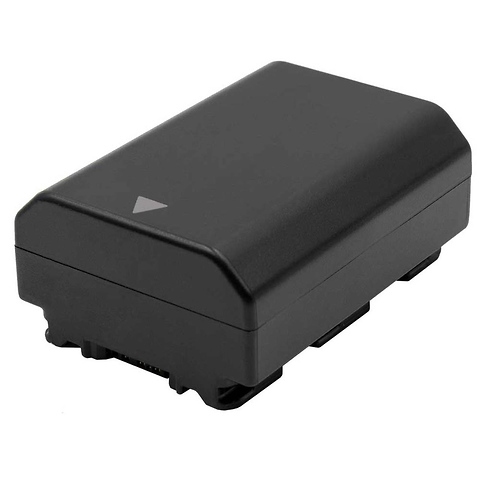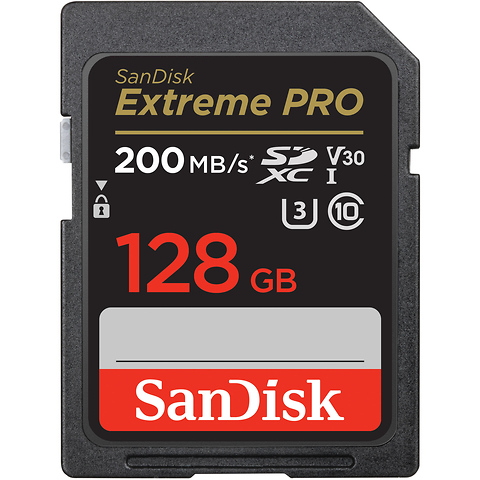My Cart

Where can I use my Samy's Camera Credit Card?
Your Samy's Camera Credit Card can be used to make purchases online, at samys.com, or at any of our Retail Locations.
What are the current special financing offers?
6 Month Special Financing* on orders totaling $199 and above.
12 Month Special Financing* available on orders totaling $599 or more.
Order minimum excludes sales tax, shipping fees, and discounts. To receive special financing, simply pay with the Samy's Camera Credit Card and select the financing option during checkout.
How will I receive my Samy's Camera Credit Card Information?
Applying for an Samy's Camera Credit Card is fast and easy. The application is subject to approval by Synchrony Bank. If approved, we'll automatically add your Samy's Camera Credit Card to your account at checkout. Select the Samy's Camera Credit Card under the payment information to pull up your available account information. You will receive your Samy's Camera Credit Card in the mail within 7-10 business days after applying.
How can I manage my account?
For Samy's Camera Credit Card accounts, you can pay your bill online or modify your account settings by clicking here:
My Account
Can I ship to an alternate address?
All orders must be shipped to the billing address on file for final approval of transaction. We can not ship to an alternate address.
Pay By Phone:
Contact Synchrony Customer Service 24/7 at (866) 396-8254.
Pay By Mail:
To ensure your payment is on time, mail in advance of the payment due date. Send payment to:
Synchrony Bank
P.O. Box 960061
Orlando, FL 32896-0061
Samy's Camera Credit Card, issued by Synchrony Bank.
No Interest if Paid in Full Within 6 or 12 Months*
On purchases of $199 or more (6 months) or $599 or more (12 months) made with your Samy's Camera Credit Card. Interest will be charged to your account from the purchase date if the promotional balance is not paid in full within 6 or 12 months. Minimum monthly payments required.
*All orders must be shipped to the billing address on file for final approval of transaction. Qualifying purchase amount must be on one receipt. A Promo Fee does not apply to this offer. No interest will be charged on the promo balance if you pay it off, in full, within the promo period. If you do not, interest will be charged on the promo balance from the purchase date. The required minimum monthly payments may or may not pay off the promo balance before the end of the promo period, depending on purchase amount, promo length and payment allocation. Regular account terms apply to non-promo purchases and, after promo period ends, to the promo balance. New Accounts as of 7/16/24: Purchase APR 34.99%. Penalty APR 39.99%.Min Interest Charge $2. A promo fee will be charged equal to 2% of the amount financed on an equal payment no interest promotion of 18 months or more. Existing cardholders: See your credit card agreement terms. Subject to credit approval. We reserve the right to discontinue or alter the terms of this offer anytime.
** New Accounts as of 7/16/24: Purchase APR 34.99%. Penalty APR 39.99%.Min Interest Charge $2. A promo fee will be charged equal to 2% of the amount financed on an equal payment no interest promotion of 18 months or more. Existing cardholders: See your credit card agreement terms.
Thanks to an evolutionary leap in image processing power and efficiency, the Sony Alpha a7R IV Mirrorless Digital Camera Body combines world’s first high-resolution 61MP back-illuminated Exmor R CMOS image sensor with impressive shooting speeds at up to 10 fps with full AF/AE tracking, as well as beautiful 4K HDR video, wide 15-stop dynamic range and high sensitivity with area specific noise reduction.
Sony Alpha a7R IV Mirrorless Digital Camera Body
FEATURES:
World’s first 61MP pixels full-frame sensor
The Alpha 7R IV features the world’s first 35mm full-frame back-illuminated CMOS image sensor with 61MP effective pixels, delivering depth and dimension that was once only available in medium-format cameras. The back-illuminated structure and effective area specific noise reduction techniques combine to deliver an extraordinary blend of low noise and high sensitivity for enormous imaging potential.
15-stop dynamic range
The Alpha 7R IV boasts an impressive 15-stop dynamic range at low sensitivities, resulting in smooth natural gradations ranging from deep shadows to highlights, and utilizes algorithms from many of the latest Alpha cameras to maintain outstanding color reproduction.
BIONZ X processing maximizes sensor potential
Advanced Detail Reproduction Technology and Area-specific Noise Reduction - both features of Sony’s BIONZ X image processing engine - have been carefully tuned to maximize the performance of a sensor that offers approximately 1.5 times more resolution than the highly acclaimed Alpha 7R III, achieving extremely fine, realistic reproduction of textures and details.
Low noise at High ISO
A standard ISO range that extends from ISO 100 up to ISO 32000 with undiminished quality is expandable to ISO 50 to ISO 102400 for still images, make it possible to achieve optimum image quality in just about any light. Noise is effectively minimized even at high sensitivities, maintaining excellent image quality even with this sensor’s high pixel count.
16-bit processing and 14-bit RAW output
Image sensor output is processed in 16-bit form by the front-end LSI and BIONZ X image processing engine before being output as compressed or uncompressed 14-bit RAW files that have smoother, more natural gradations for higher overall image quality. 14-bit RAW output is available even when shooting in silent or continuous mode.
Serious speed up to 10fps with AF/AE tracking
An advanced mechanical shutter unit and updated image processing algorithms allow the innovative new full-frame Alpha 7R IV to shoot full 61MP resolution images at up to 10 fps with continuous and accurate autofocus and auto exposure (AF/AE) tracking for up to approximately seven seconds in JPEG and RAW, and approx. three times as long in 26.2MPii APS-C crop mode. These high-speed options ensure that fast moving subjects can be captured with extreme accuracy and incredible image detail.
4D FOCUS – Wide, fast, reliable AF gets the shot
The new image sensor in the Alpha 7R IV features 567 phase detection points in a high-density focal plane phase-detection AF system, covering approximately 99.7% of the image area vertically and 74.0% horizontally. High-density focal plane phase-detection works with 425 contrast AF points in a Fast Hybrid AF system that can handle a huge volume of data at high speed, snapping rapidly into focus with just about any subject and situation. Tracking performance has been improved too, despite the significant increase in resolution.
Real-time Autofocus Tracking
Real-time Tracking is a state-of-the-art feature that employs artificial intelligence to tenaciously track moving subjects when shooting stills or movies. Accurate focus is maintained automatically while the shutter button is half-pressed. The subject to be tracked can also be specified by touching it on the monitor when the Touch Tracking function is engaged. An advanced subject recognition algorithm uses color, pattern (brightness), and subject distance (depth) data to process spatial information in real time. If the subject is a person, AI is used to detect and keep track of the subject’s eye and face in real time for extremely high tracking precision. The focus area will seamlessly change between face and eye according to the condition of the subject.
Real-time Eye AF
Real-time Eye AF employs artificial intelligence to detect and process eye data in real time, and track the subject’s eye with unprecedented precision. This function can be activated via an assigned custom key, or by simply pressing the AF-ON button or half-pressing the shutter button. When used with the Real-time Tracking function, tracking will continue even if the camera is temporarily unable to locate the subject’s eye, so it is easier than ever to shoot dynamic portraits of moving subjects. In addition to automatic eye selection when using Eye AF, it is also possible to manually preselect the subject’s right or left eye.
Real-time Eye AF for animals
Advanced AI-based subject recognition technology now allows fast, precise, automatic detection and tracking of animal eyes. This new capability can vastly increase success rates when photographing animals in a variety of settings or pets at home. Real-time Eye AF animal mode can be initiated either by pressing an assigned custom button or by half-pressing the shutter button.
Real-time Eye AF for movies
The Alpha 7R IV debuts Real-time Eye AF for movie shooting, a first in any of Sony’s cameras. When activated, human eyes are automatically identified and precisely tracked with high precision and reliability, allowing the shooter to focus on the content itself as opposed to what is in focus or not. The same Touch Tracking functionality that is provided for stills is also available for movie shooting, easily initiating Real-time Eye AF tracking on a specified eye. Right/left eye selection is available for movies too.
Reliable low-vibration shutter
The shutter unit assembly has been carefully re-designed to reduce even the slightest movement that may cause blur, which is critical with high resolution sensors. Shutter vibration that can cause blur is reduced to a minimum, even when shooting continuous bursts at up to 10 frames per second, thanks to a new shutter unit with a fast-response coreless motor. The system also includes a brake that subdues mechanical front and rear curtain shutter vibration, and dampers that absorb mechanical shock. Low shutter vibration is critical to achieving full quality from the camera’s high-resolution image sensor. The shutter is also quiet, and has been tested for durability in excess of 500,000 shutter cycles.
Silent shooting
In addition to the mechanical shutter, the Alpha 7R IV has an electronic shutter that operates without moving parts for silent, vibration-free shooting. This also makes it easier to elicit maximum performance from the camera’s high-resolution sensor.
5-axis image stabilization
A precision stabilization unit and gyro sensors work with refined image stabilization algorithms to achieve up to a 5.5-step shutter speed advantage that also supports the high-resolution capabilities of the 61-megapixel sensor. Camera shake is effectively compensated on 5 axes: pitch and yaw, X and Y shift and roll. The live view image is also stabilized while shooting stills, making it easier to frame and focus when using a telephoto or macro lens. In-body image stabilization means that effective stabilization can be achieved with a wide range of lenses. 5-axis image stabilization is effective for movies as well as stills.
5.76 million-dot UXGA OLED Tru-Finder
The Alpha 7R IV boasts a 5.76 million dot UXGA OLED Tru-finder EVF - Sony’s highest resolution viewfinder ever - at about 1.6x the resolution of the EVF in the Alpha 7R III. This new viewfinder provides an extremely accurate, true-to-life depiction of the scene being framed. The display quality can be set to ‘Standard’ or ‘High’ mode, and to either 60 fps or 120 fps refresh rate that provides a smooth viewfinder image with minimum display motion blur when shooting moving subjects. The eyepiece window is fluorine coated to repel fingerprints and grime, and make it easier to clean.
16-image Pixel Shift Multi Shooting
When even higher resolution is needed, Pixel Shift Multi Shooting takes advantage of the advanced in-body image stabilization system to capture multiple pixel-shifted images that are later composited using Sony’s “Imaging Edge™” desktop application to achieve overwhelming resolution in a single image. In addition to 4-image composites, the Alpha 7R IV is capable of producing 16-image composites with approximately 240.8 million pixels (19008 x 12672 pixels) from data that is equivalent to approximately 963.2 million pixels. The result is photographs with detail and presence that are simply stunning. Resolution, color, and material textures are astonishingly realistic even when the image is enlarged by more than 100% and ideal for photographing architecture, art or any other still life subject.
Record reality in spectacular 4K
In addition to its impressive still image capabilities, the new Alpha 7R IV performs exceptionally well as a serious filmmaking tool, offering 4K (3840x2160 pixels) video recording across the full width of the image sensor, and full pixel readout without pixel binning in Super 35mm mode. This ensures high quality 4K footage with exceptional detail and depth. S-Log 2 and S-Log 3 are also available to maximize color grading flexibility, with S-Log 3 offering a total of 14-stops of dynamic range. HLG (Hybrid Log-Gamma) is available on the Alpha 7R IV as well to support an Instant HDR workflow.
Touch Tracking for movies
Touch Tracking is beneficial for movie recording. Touch the subject to be tracked on the monitor, and the Real-time Tracking function will then process color, pattern (brightness), distance (depth), and face information to precisely and smoothly track the selected subject at the specified sensitivity and speed. It is also possible to half-press the shutter button or press the AF ON button while shooting to achieve fast focus (AF-S). This can be an advantage for weddings or documentaries, where there is only one chance to capture a scene. In such cases the focus area selected in advance is applied.
Wireless tethering (PC Remote for Professional Workflow
Wireless connectivity and PC Remote shooting let the photographer move around with fewer restrictions for a smoother, more efficient setup and workflow. The ability to connect the camera and computer via 2.4 GHz or 5 GHz Wi-Fi provides the versatility, reliability, and speed needed to transfer image data to the computer while shooting images in continuous mode. With the camera and computer connected using Sony’s Imaging Edge “Remote” software application (Ver. 2.0 or later), it is easier than ever to shoot, change camera settings, and transfer and store still images. In addition to wirelessly connecting the camera directly to the computer, the connection can be made via a wireless access point for compatibility with a variety of network environments.
Super speed USB Type-C
In addition to high speed Wi-Fi and wireless PC connectivity, the Alpha 7R IV is equipped with a SuperSpeed USB (USB 3.2 Gen 2) USB Type-C connector that supports extremely fast wired data transmission, with almost doubled data transfer speed achieved in combination with Sony’s Imaging Edge software (compared to the Alpha 7R III), plus FTP data transfer with background transfer capability, allowing images to be sent to a specified FTP remote server while the photographer is still shooting or reviewing images.
Imaging Edge desktop applications
To support an efficient, high speed, connected professional workflow, Sony has announced version 2.0 of its “Imaging Edge” desktop applications. Use "Remote" to control and monitor shooting live on your PC screen; "Viewer" to quickly preview, rate, and select photos from large image libraries; and "Edit" to develop RAW data into high-quality photos for delivery. Get the best from Sony RAW files, and manage your productions more efficiently. The Pixel Shift Multi Shooting feature can also be used while the camera and PC are tethered, and the pixel-shifted images can be immediately composited and viewed. To maximize convenience in image transfer, when utilizing the latest version of Sony’s Imaging Edge Mobile™ application, the camera can now transfer images to a connected smartphone even if the camera’s power is set to OFF.
Enhanced dust and moisture resistance
Dust and moisture resistance have been significantly improved with refinements throughout the body. Additional sealing is provided at all body seams as well as the battery compartment cover, and the media slot now has a double sliding cover rather than the previous hinged cover to keep water out. A redesigned lens lock button and additional cushioning around the mount further contribute to outstanding reliability in challenging outdoor conditions. Importantly, all of this has been accomplished in a body that is about the same size as the Alpha 7R III.
Designed and built for durability
Body durability has been enhanced by the use of a lightweight, high-rigidity magnesium alloy for the top cover, front cover, internal frame, and rear cover. Attachment points and rigidity at the lens mount are ample too, providing the strength needed for heavy lenses. In addition, to minimize stress when shooting for long periods of time and/or with long telephoto lenses, the grip area has been redesigned for greater comfort and surer hold. Ample room is provided for the little finger, and overhang in the middle finger area has been increased.
Dual UHS-II slots
The Alpha 7R IV has two media slots that are both compatible with UHS-I and UHS-II SD cards for higher overall capacity and faster read/write speeds. Data can be simultaneously recorded to both cards for backup, RAW/JPEG and stills/movies can be recorded to different cards, or recording can be automatically switched to the second card when the first becomes full.
Extended endurance
Sony’s high-capacity Z batteries and circuitry designed for low power consumption make it possible to shoot up to 670 still images when using the LCD monitor or 530 images when using the viewfinder on a single charge, despite substantial increases in sensor and EVF resolution. For even more uninterrupted operating time, the optional VG-C4EM Vertical Grip holds two NP-FZ100 batteries. The camera can also be powered from an external mobile battery via its USB Type-C and Multi/Micro USB connectors.
Selectable focus frame color
The focus frame color can be set to white or red. Red can improve visibility in situations where subject and focus frame color contrast is low and it is difficult to make out the focus area against the subject. The focus frame will appear in magenta if focus cannot be acquired when the shutter button is pressed.
Recommended Accessories
Sony NP-FZ100 Rechargeable Battery
Extend your shooting sessions with the Sony NP-FZ100 Rechargeable Battery. Its high-capacity design ensures you have the power needed for long shoots, whether in the studio or on location.
Sony BC-QZ1 Battery Charger
The Sony BC-QZ1 Battery Charger offers efficient charging for your NP-FZ100 batteries, keeping you ready for extended sessions. Compact and easy to use, it’s a perfect addition to your photography gear.
Advanced Image Quality and Versatility
The Sony Alpha a7R IV Mirrorless Digital Camera Body delivers remarkable image quality, cutting-edge autofocus, and versatile video capabilities, making it an excellent choice for professional and hobbyist photographers alike.
Explore our full range of Sony products, including cameras, lenses, and accessories, to complement your creative workflow.
1/4 - 1/8000 Second in Movie Mode





